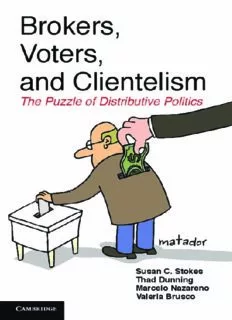Table Of ContentBrokers,Voters,andClientelism
Brokers,Voters,andClientelismaddressesmajorquestionsindistributivepolitics.Why
isitacceptableforpartiestotrytowinelectionsbypromisingtomakecertaingroups
ofpeoplebetteroff,butunacceptable–andillegal–topaypeoplefortheirvotes?Why
dopartiesoftenlavishbenefitsonloyalvoters,whosesupporttheycancountonany-
way,ratherthanonresponsiveswingvoters?Whyarevotebuyingandmachinepolitics
commonintoday’sdevelopingdemocraciesbutathingofthepastinmostoftoday’s
advanceddemocracies?Thisbookdevelopsatheoryofbroker-mediateddistributionto
answerthesequestions,testingthetheorywithresearchfromfourdevelopingdemoc-
racies, and reviews a rich secondary literature on countries in all world regions. The
authorsdeploynormativetheorytoevaluatewhetherclientelism,pork-barrelpolitics,
andothernonprogrammaticdistributivestrategiescanbejustifiedonthegroundsthat
theypromoteefficiency,redistribution,orvoterparticipation.
Susan C. Stokes is John S. Saden Professor of Political Science at Yale University and
DirectoroftheYaleProgramonDemocracy.SheisamemberoftheAmericanAcademy
ofArtsandSciences,apastvicepresidentoftheAmericanPoliticalScienceAssociation
(APSA),andapastpresidentofAPSA’sComparativePoliticsSection.Herbooksand
articles explore democratization and how democracy works in developing countries.
HerresearchhasbeensupportedbygrantsandfellowshipsfromtheNationalScience
Foundation,theGuggenheimMemorialFoundation,theRussellSageFoundation,the
AmericanPhilosophicalSociety,theMacArthurFoundation,andFulbrightprograms.
ThadDunningisProfessorofPoliticalScienceatYaleUniversity.Hestudiescompar-
ativepolitics,politicaleconomy,andmethodology.Hisfirstbook,CrudeDemocracy:
Natural Resource Wealth and Political Regimes (Cambridge University Press, 2008),
wontheBestBookAwardfromtheComparativeDemocratizationSectionofAPSAand
the Gaddis Smith Prize for the best first book on an international topic by a member
oftheYalefaculty.Dunninghasalsowrittenonarangeofmethodologicaltopics;his
second book, Natural Experiments in the Social Sciences: A Design-Based Approach
(CambridgeUniversityPress,2012),developsaframeworkforthediscovery,analysis,
andevaluationofstrongresearchdesigns.
MarceloNazarenoisProfessorofPoliticalScienceattheNationalUniversityofCo´rdoba
andProfessorofMethodologyandPublicPolicyattheCatholicUniversityofCo´rdoba.
HeholdsaPhDinsocialscienceaswellasadvanceddegreesinpublicadministration
andinhistory.HehasbeenavisitingresearcheratYaleUniversityandtheUniversity
ofChicago.Hispublications,injournalssuchasDesarrolloEcono´micoandtheLatin
AmericanResearchReview,touchonthethemesoftheleftinLatinAmerica,clientelism
anddistributivepolitics,andfiscalfederalism.
ValeriaBruscoholdsamaster’sdegreeininternationalrelationsandiscompletingher
doctoraldissertationattheNationalUniversityofSanMart´ıninBuenosAires.Sheis
interested in how organizational agents, whether in political parties or in nongovern-
mentalorganizations,dealwithpoverty,andshehaspublishedarticlesonthistopicas
wellasoncompetitiveclientelism.Sheteaches attheNationalUniversityofCo´rdoba
and at the Catholic University of Co´rdoba, Argentina. Brusco has also held a staff
postinthemunicipalgovernmentofthecityofCo´rdoba,isactiveinpartypoliticsin
Argentina,andhelpsleadasportsorganizationforunderprivilegedyouth.
CambridgeStudiesinComparativePolitics
GeneralEditor
MargaretLevi UniversityofWashington,Seattle
AssistantGeneralEditors
KathleenThelen MassachusettsInstituteofTechnology
ErikWibbels DukeUniversity
AssociateEditors
RobertH.Bates HarvardUniversity
GaryCox StanfordUniversity
StephenHanson TheCollegeofWilliamandMary
TorbenIversen HarvardUniversity
StathisKalyvas YaleUniversity
PeterLange DukeUniversity
HelenMilner PrincetonUniversity
FrancesRosenbluth YaleUniversity
SusanStokes YaleUniversity
OtherBooksintheSeries
BenW.Ansell,FromtheBallottotheBlackboard:TheRedistributive
PoliticalEconomyofEducation
LeonardoR.Arriola,Multi-EthnicCoalitionsinAfrica:BusinessFinancingof
OppositionElectionCampaigns
DavidAusten-Smith,JeffryA.Frieden,MiriamA.Golden,KarlOveMoene,
andAdamPrzeworski,eds.,SelectedWorksofMichaelWallerstein:The
PoliticalEconomyofInequality,Unions,andSocialDemocracy
AndyBaker,TheMarketandtheMassesinLatinAmerica:PolicyReform
andConsumptioninLiberalizingEconomies
LisaBaldez,WhyWomenProtest:Women’sMovementsinChile
StefanoBartolini,ThePoliticalMobilizationoftheEuropeanLeft,
1860–1980:TheClassCleavage
RobertBates,WhenThingsFellApart:StateFailureinLate-CenturyAfrica
MarkBeissinger,NationalistMobilizationandtheCollapseoftheSovietState
NancyBermeo,ed.,UnemploymentintheNewEurope
ContinuedaftertheIndex
Brokers, Voters, and Clientelism
The Puzzle of Distributive Politics
SUSAN C. STOKES
YaleUniversity
THAD DUNNING
YaleUniversity
MARCELO NAZARENO
UniversidadNacionaldeCo´rdoba
VALERIA BRUSCO
UniversidadNacionaldeCo´rdoba
32AvenueoftheAmericas,NewYork,NY10013-2473,USA
CambridgeUniversityPressispartoftheUniversityofCambridge.
ItfurtherstheUniversity’smissionbydisseminatingknowledgeinthepursuitof
education,learning,andresearchatthehighestinternationallevelsofexcellence.
www.cambridge.org
Informationonthistitle:www.cambridge.org/9781107660397
(cid:2)C SusanC.Stokes,ThadDunning,MarceloNazareno,andValeriaBrusco2013
Thispublicationisincopyright.Subjecttostatutoryexception
andtotheprovisionsofrelevantcollectivelicensingagreements,
noreproductionofanypartmaytakeplacewithoutthewritten
permissionofCambridgeUniversityPress.
Firstpublished2013
PrintedintheUnitedStatesofAmerica
AcatalogrecordforthispublicationisavailablefromtheBritishLibrary.
LibraryofCongressCataloginginPublicationdata
Stokes,SusanCarol.
Brokers,voters,andclientelism:thepuzzleofdistributivepolitics/SusanC.
Stokes,YaleUniversity,ThadDunning,YaleUniversity,MarceloNazareno,
NationalUniversityofCo´rdoba,Argentina,ValeriaBrusco,NationalUniversity
ofCo´rdoba,Argentina.
pagescm.–(Cambridgestudiesincomparativepolitics)
Includesbibliographicalreferencesandindex.
ISBN978-1-107-04220-9(hardback)–ISBN978-1-107-66039-7(pbk.)
1.Politicalplanning–Economicaspects. 2.Politics,Practical–Economic
aspects. 3.Politicalscience–Economicaspects. 4.Finance,Public–Political
aspects. 5.Economicpolicy–Politicalaspects. 6.Politicalethics. I.Title.
JF1525.P6S76 2013
324–dc23 2013007954
Cambridge University Press has no responsibility for the persistence or accuracy of URLs for
externalorthird-partyInternetWebsitesreferredtointhispublicationanddoesnotguarantee
thatanycontentonsuchWebsitesis,orwillremain,accurateorappropriate.
Sue: My deep appreciation goes to my sons, Sam, David, and Andy,
whose curiosity about the world is inspiring, and to Steve Pincus,
wonderful scholar and wonderful husband.
Thad: I give my heartfelt thanks to my family, and especially my
partner Jennifer, for the humor, kindness, and patience on which I so
rely.
Marcelo: I wish to express special gratitude to Laura and to our
children, Santiago, Diego, Lautaro, and Lucı´a, for their patience and
support during these years.
Valeria: I wish to thank Mateo y Lucı´a, my kids, because they walked
(and traveled) with me.
Contents
ListofTables pagexi
ListofFigures xiii
PrefaceandAcknowledgments xvii
i modalities of distributive politics
1 BetweenClientsandCitizens:PuzzlesandConcepts
intheStudyofDistributivePolitics 3
1.1 ConceptualizingModesofDistribution 6
1.2 BasicQuestionsAboutDistributivePolitics 18
1.3 WhyStudyClientelism? 22
1.4 StructureoftheBook 24
1.5 ACommentonResearchMethods 26
ii the micro-logic of clientelism
2 GapsBetweenTheoryandFact 31
2.1 TheoriesofDistributivePolitics 32
2.2 ExplainingtheAnomaly:Is“Loyalty”Endogenous? 54
2.3 ExplainingtheAnomaly:Turnout-Buying? 66
2.4 ExplainingtheAnomaly:Subcontracting? 72
3 ATheoryofBroker-MediatedDistribution 75
3.1 AModelofRent-SeekingBrokers 77
3.2 TheObjectivesofPartyLeaders 91
3.3 TheImplicationsofAgencyLoss 92
4 TestingtheTheoryofBroker-MediatedDistribution 96
4.1 WhoAretheBrokers? 98
ix
Description:Brokers, Voters, and Clientelism addresses major questions in distributive politics. Why is it acceptable for parties to try to win elections by promising to make certain groups of people better off, but unacceptable - and illegal - to pay people for their votes? Why do parties often lavish benefits

